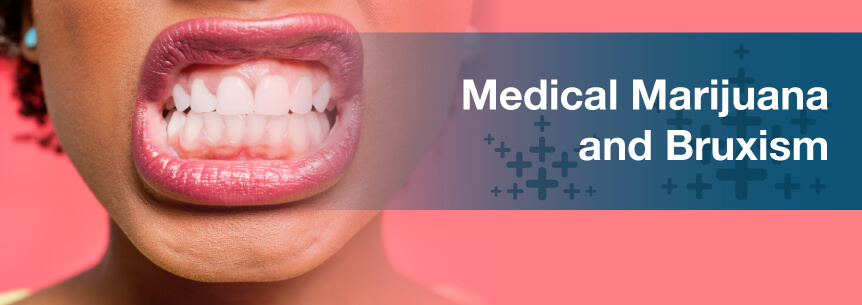
Cannabis can alleviate many symptoms of bruxism and doesn’t have the harsh side effects many treatments come with. Therefore, individuals are now seeking medical marijuana treatment to ease their discomfort and undesirable symptoms of the condition.
While bruxism isn’t a dangerous condition, it may cause uncomfortable jaw pain, ear pain, headaches and permanent teeth damage.
Since stress is a primary cause of bruxism, cannabis may serve as a good alternative treatment for bruxism without the harmful side effects because it has the following qualities:
Cannabinoids in low doses can reduce motor activity. This means medical cannabis can be used for bruxism to help patients regain control over their jaw muscles, stopping the grinding and clenching.
Find A Doctor Find A Dispensary
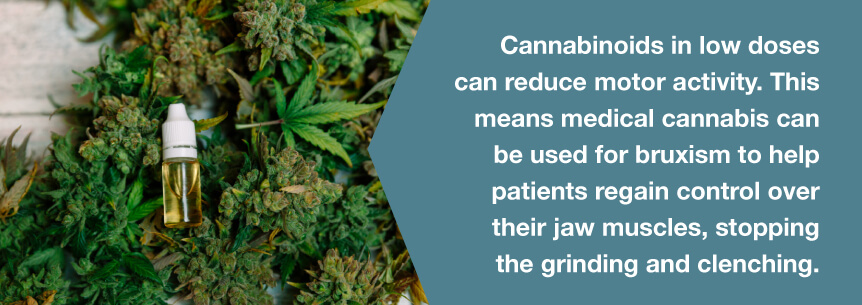
Users of medical marijuana may have side effects, which depend on the strain ingested. Possible side effects you may incur:
If you experience bothersome side effects of medical cannabis, talk to your doctor or budtender about trying a different strain or form of taking marijuana.
Smoking marijuana versus taking cannabis in another form can lead to similar side effects that smoking cigarettes can cause, such as:
Best Strains of Marijuana to Use for Bruxism Symptoms and Treatment Side Effects
When looking for strains for bruxism, the main symptoms you’re looking to relieve are for stress and sleep.
Some good anti-stress strains include:
Medical marijuana helps individuals fall asleep quicker and stay asleep. It also keeps them in Stage 3 deep sleep and Stage 4 REM sleep longer. Indica strains seem to be the best for sleep issues since they help promote sleep and stay asleep better than pure sativas or sativa-dominant types.
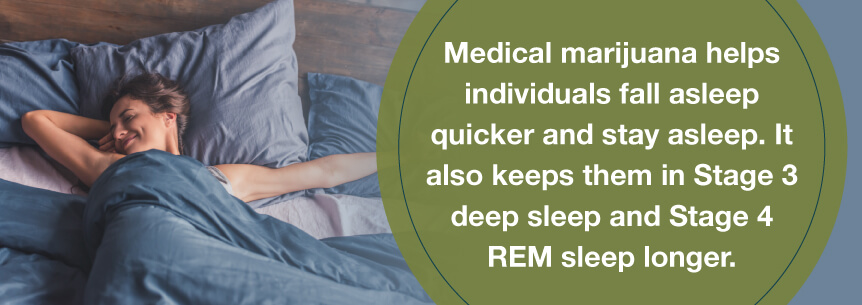
Some good strains to help you sleep better include:
When looking for strains to promote better sleep, know that indicas have a sedating tendency, whereas sativas can make you feel more energized and alert. Therefore, choose indica strains over sativa for insomnia or sleep-related issues. Since edibles take longer for their effects to kick in and you experience their benefits in your system for a more prolonged period than other forms of ingesting marijuana they can be a beneficial method for sleep issues.
You’ll find a variety of ways to consume your marijuana for bruxism treatment. You can vape it, smoke it, drink it, eat it or apply it to your skin. Below are the different methods of consuming medical pot.
Generally, you have:
You can break it down even further to:
While some delivery methods may have been left out, these are among the common ones. Experiment a little and see which method or methods you prefer for your cannabis for bruxism treatment. The best method of taking medical cannabis depends on your personal preferences and how important price, strength and convenience are to you, combined with the input of your doctor.
Although every state is different in their laws regarding cannabis, states that legalize it seem to follow similar procedures. States often require you to obtain a recommendation from a doctor that says you have a medical condition that can be improved with medical marijuana.
Once you find and see a cannabis doctor and receive your recommendation, you can then shop for a dispensary to purchase your marijuana products to treat bruxism. Marijuana Doctors is your one-stop shop resource with a large database of qualified doctors and dispensaries.
Find A Doctor Find A Dispensary
Bruxism is a condition where you gnash, clench or grind your teeth. With this condition, you may grind your teeth at night while sleeping — sleep bruxism — or do it unconsciously during the day — awake bruxism.
Doctors consider sleep bruxism a type of sleep-related movement disorder. Those who grind or clench their teeth while they’re sleeping have a higher likelihood of having another sleep disorder like snoring or sleep apnea, which is when you stop breathing while sleeping.
According to the American Sleep Association, bruxism affects around 10 percent individuals overall but 15 percent children. The prevalence of the condition seems to decrease with age. It’s seen most often in children and is rare in individuals over 65. Often, people will grind and clench their teeth only occasionally, but a small percentage of individuals do so more regularly and experience complications because of it. Bruxism rates are as high as 50 percent in individuals with a family history of the condition.
In most cases, you don’t require treatment with mild bruxism. But, some individuals’ bruxism is more severe and damaging. Since you could be suffering from sleep bruxism and not realize you have the condition until complications develop, having a regular dental checkup and knowing the symptoms and signs of bruxism is vital.
Symptoms and signs of bruxism might include:
If you or your partner notice any of these signs or symptoms or you have concerns about your jaw or teeth, see your doctor or dentist.
The causes of bruxism are debatable. Certain factors can increase your chances of developing bruxism, including:
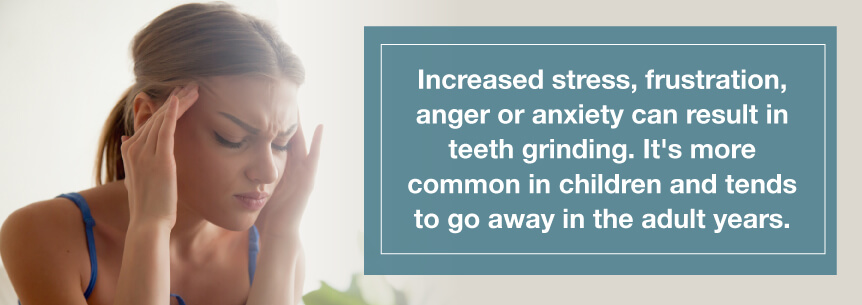
While the exact cause of bruxism isn’t clear, both psychological and physical reasons tend to be associated with teeth-grinding. The most common links seem to be sleep issues like sleep talking, snoring and sleep apnea, according to The Bruxism Association.
According to some research, depression and anxiety can lead to bruxism. Throughout history, people have thought of teeth grinding as a physical manifestation of anxiety and stress. People who grind their teeth report more depression and anxiety symptoms, say they experience greater stress in life and have a higher risk of suffering from mood disorders.
The link between bruxism and mood disorders means that people who regularly experience normal negative emotions could also be at a higher risk for bruxism. Most studies have focused on clinical depression, acute anxiety and other diagnosed mood disorders, but some research shows a link between muscular tension and physical anxiety with chronic bruxism.
Clenching the teeth is seen in animals and humans and animals to display frustration, hostility or anger. In human beings, we had the instinct to clench our teeth as a visual threat to a predator or rival. In many cultures, the clenching of teeth links with madness, physical pain, possession and suffering.
Over the years research has identified many reasons why people grind their teeth. For instance:
Bruxism has been redefined recently by an international expert commission as “repetitive jaw muscle activity” characterized by teeth grinding or clenching, or by thrusting or bracing your jaw.
Many scientists now agree individuals dealing with any stressful influence leading to anger, tension, inner turmoil and arousal at bedtime are more inclined to develop bruxism.
Studies also recently evaluated Botox injections for the treatment of sleep bruxism. How hard people clenched their jaws during bruxism episodes decreased after four weeks of injection, but there wasn’t any change in the number of episodes per sleep hour.
If you show any symptoms of bruxism, your dentist will examine your mouth and teeth for any changes over the next few visits and monitor for progression that requires treatment. If they think you have bruxism, they’ll try to figure out what’s causing it by asking you some general dental health questions and questions about your daily routines, medications you’re taking and sleep habits. Your dentist may also take x-rays.
To determine the severity of your bruxism, they may check for:
The dentist may detect other conditions through the dental exam that cause similar ear or jaw pain like TMD or other health conditions or dental problems.
If your dentist suspects your bruxism is related to significant sleep problems, they may refer you to a sleep professional. They will conduct some tests to assess for teeth grinding and other sleep disorders like sleep apnea.
If your bruxism is related to psychological issues like anxiety, they may refer you to a counselor or licensed therapist.
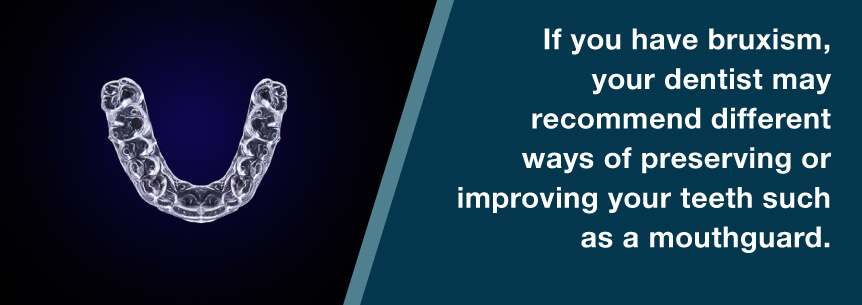
If you have bruxism, your dentist may recommend different ways of preserving or improving your teeth such as:
Even though these methods can help correct or prevent teeth wear, they are unlikely to stop your bruxism altogether.
Medications are generally not that effective in treating bruxism, but some are useful, including:
Side effects of Botox include:
Side effects of muscle relaxants include:
Side effects of antidepressants include: